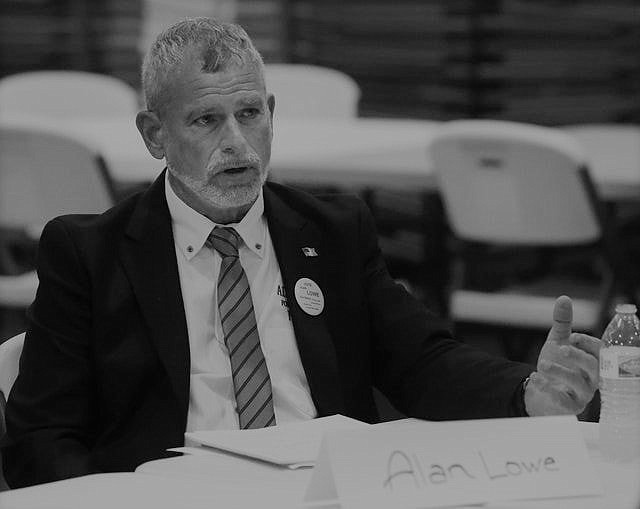- December 13, 2025

Palm Coast mayoral candidate Alan Lowe’s past has received scrutiny during this election season, with six accusations gathered on the website www.NoToLowe.com. Lowe met recently with the Palm Coast Observer to respond to the allegations, and a summary of the discussion follows.
First, the website says Lowe failed to pay more than $29,000 in income taxes in 1992-1993, leading to the IRS placing a lien on his home in 1997.
“I had no idea there was a tax lien,” Lowe said. “It’s not trying to defraud the IRS. … I was going through a split-up and a foreclosure. … The important thing is not that I owed it, it’s that it was satisfied.” He said he paid the debt over time until it was complete in 2005.
Second, the website says Lowe “scammed SunTrust Bank.” According to a 7th Circuit Court document, Lowe had two mortgages on a home in Palm Coast’s C-section in 1993. To help pay the IRS, he attempted to refinance the second mortgage with SunTrust.
After SunTrust did a title search — but before the closing of the refinanced mortgage — a lot happened, without SunTrust’s knowledge. First, Lowe gave the property to his father via quit-claim deed. His father then gave the property to Lowe’s mother via quit-claim deed. Effectively, therefore, Lowe’s mother owned the property. After those quit-claim deeds, Lowe’s mother signed an affidavit claiming that Alan Lowe still owned the property. SunTrust was also not informed that there was an IRS lien on the property.
The refinancing went through, and Lowe received “the proceeds,” the document states.
In October 1993, SunTrust then learned it owed the IRS for the lien. The bank contacted the Lowes to work out an arrangement, but the Lowes said they weren’t responsible to pay, forcing SunTrust to pay the IRS more than $12,000.
SunTrust sued him, and the court ordered Lowe, individually, and his parents, Isabel and Donald, as trustees, to pay SunTrust more than $59,000, including what was due on the second mortgage, the taxes owed to the IRS, and the attorneys’ fees. The home was sold to the highest bidder in a foreclosure sale in June 1996 to pay off SunTrust. The quit-claim deeds were canceled.
Lowe said in an interview that the ownership issue was a misunderstanding.
“I was taking my name off the house to put it in my family trust, but it went into foreclosure, and it was foreclosed on,” he said. “So, there was no money. … SunTrust didn’t lose the money; they got the house.”
NoToLowe.com also notes that Lowe is on a court docket for a misdemeanor theft in 1992. However, Lowe said the first he had heard of it was in July 2020, and he went to the courthouse to find more information. There was never a hearing on the issue, and there was no other person’s name on record, so therefore no accuser. The misdemeanor was never prosecuted, and he said he knows nothing about it. He produced an email from the Florida Department of Law Enforcement that informs him he has no criminal record.
The website says Lowe also defaulted on a Best Buy credit card in 2015. Lowe says he has never owned a Best Buy credit card and that it must have been a mistake.
The website says Lowe failed to “fulfill CITES (Convention on International Trade in Endangered Species) obligations” in connection with a coral export business he owned on the island of Dominica. He said the government there failed to fill out the appropriate paperwork on a shipment of coral, and after the paperwork was resolved, the shipment went throughout incident.
Finally, the website points out that Lowe has had five businesses closed in his past. He said that on each instance, the business served its purpose as he pursued his next venture. For example, he owned a company called Finest Brine to sell the excess sea monkeys as he was attempting to invent a new way to feed astronauts on their way to Mars. Once the sea monkeys were gone, there was no need to keep the business.